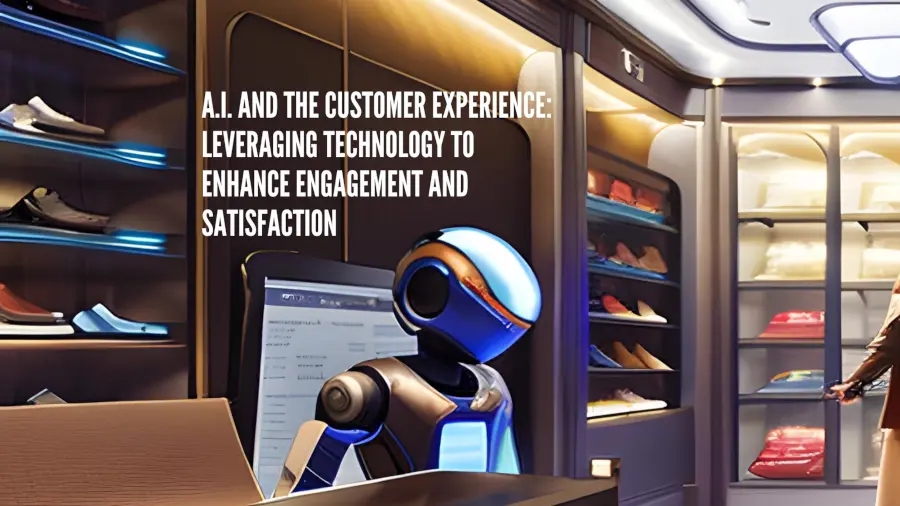The customer experience is a crucial factor in the success of any business. You don’t have to be a business owner or executive to know this is truism. In today’s fast-paced and tech-driven world, leveraging the power of Artificial Intelligence (A.I.) can be the key to enhancing Customer Experience (CX) and, ultimately, driving growth and profitability. But can businesses effectively utilize A.I. to improve the customer experience? In this article, we’ll explore the many ways in which A.I. can transform CX, examining real-life case studies of companies that have successfully implemented A.I. solutions. We’ll also take a look at emerging trends and potential challenges to help business leaders prepare for the future. So, if you’re ready to take your customer experience to the next level, buckle up and join us on this exciting journey into the world of A.I. and CX.
- Understanding the Customer Experience
- How A.I. Can Enhance CX
- Case Studies: Companies Leveraging A.I. for CX
- Emerging Trends and Challenges
- The Future of A.I. and CX
- Potential Challenges of A.I. in CX
- Conclusion
Understanding the Customer Experience
To effectively leverage A.I. for CX, it’s essential to understand what CX is and why it’s important. At its core, Customer experience (CX) refers to the overall impression a customer has of a brand or business based on all of their interactions and touchpoints with that brand. This includes everything from the first time a customer learns about a brand to their interactions with customer service and support. CX encompasses both the rational and emotional elements of customer interactions, including factors such as ease of use, quality of service, and emotional connection. In short, customer experience is the sum total of all the experiences a customer has with a brand, and it can have a significant impact on customer loyalty, satisfaction, and retention. Therefore, it should go without stating, positive CX is crucial for building customer loyalty and driving revenue, making it a top priority for businesses of all sizes.

How A.I. Can Enhance CX
A.I. has a range of applications that can significantly improve CX. One such application is personalization. By utilizing customer data, A.I. algorithms can tailor recommendations and promotions to each customer’s unique interests and preferences, making them feel seen and valued. Personalization has been shown to increase customer loyalty, engagement, and ultimately, revenue. For example, Amazon’s recommendation engine, powered by A.I., has been a driving force behind its success. The engine uses past purchases, search history, and other data points to suggest items to customers that they are more likely to buy. According to a report by McKinsey, Amazon’s recommendation engine drives 35% of its total revenue.
Another way A.I. can enhance CX is through improved customer service. A.I.-powered chatbots and virtual assistants can answer customer queries and provide support 24/7, freeing up human support staff to handle more complex issues. Chatbots can provide quick and efficient responses to common queries, such as shipping times or product availability, while virtual assistants can handle more complex tasks, such as booking appointments or processing payments. This not only improves CX but also saves businesses time and money. For example, Bank of America utilizes an A.I.-powered virtual assistant called Erica, which has handled more than 200 million customer requests since its launch in 2018.
Predictive analytics is yet another area where A.I. can help businesses anticipate customer needs and preferences, allowing them to proactively address potential issues and create more personalized experiences. By analyzing customer data, A.I. can predict future behavior and preferences, such as products they may be interested in or the best time to reach out to them. This can help businesses create targeted marketing campaigns, offer personalized promotions, and make better business decisions.
Case Studies: Companies Leveraging A.I. for CX
Several companies have successfully implemented A.I. solutions to enhance CX. Amazon’s personalized product recommendations and automated customer support are excellent examples of A.I. in action. Starbucks uses A.I. to provide personalized drink recommendations through its mobile app. The app allows customers to order their drinks in advance and recommends personalized suggestions based on previous orders and preferences. This has led to increased engagement and loyalty among customers. Bank of America utilizes virtual assistants to answer customer queries and provide support. Their A.I.-powered virtual assistant, Erica, has been a huge success, handling more than 200 million customer requests since its launch in 2018. By providing quick and efficient responses to customer queries, Erica has improved CX while reducing support costs for the bank.
Another company that has leveraged A.I. for CX is Sephora. The beauty retailer uses an A.I.-powered chatbot called Sephora Virtual Artist to help customers find the perfect makeup products. The chatbot uses facial recognition technology to analyze a customer’s face and recommend products based on their skin tone, features, and preferences. This has led to a more personalized and engaging shopping experience for customers, increasing sales and loyalty.

Emerging Trends and Challenges
As with any emerging technology, there are challenges to adopting A.I. for CX. One significant challenge is the potential for A.I. to reinforce existing biases in the data used to train algorithms. For example, if an A.I. algorithm is trained on historical data that reflects biased practices or customer behavior, the algorithm could replicate and amplify these biases. This is particularly concerning in areas such as hiring, lending, and insurance, where biased algorithms could have a significant impact on people’s lives. To address this challenge, businesses need to prioritize diversity, equity, and inclusion in both their data collection and algorithm development processes.
Another emerging trend in A.I. for CX is the use of natural language processing (NLP) and sentiment analysis. NLP allows A.I. algorithms to understand and respond to human language, enabling more natural and intuitive interactions between customers and businesses. Sentiment analysis, on the other hand, allows businesses to analyze customer feedback and sentiment to identify areas for improvement and track CX metrics over time. These technologies are still in their early stages but have enormous potential to transform CX in the coming years.
The Future of A.I. and CX
As A.I. technology continues to evolve, there are several emerging trends that could have a significant impact on CX in the coming years. One trend is the use of A.I. to power voice assistants such as Amazon’s Alexa and Google Assistant. By using natural language processing and machine learning, these devices can provide customers with personalized and intuitive interactions, allowing them to control their smart homes, make purchases, and access information with ease.
Another emerging trend is the use of A.I. in augmented and virtual reality experiences. For example, retailers could use A.I. to create personalized virtual shopping experiences for customers, while travel companies could use A.I. to create virtual tours of destinations. These technologies have the potential to create entirely new levels of engagement and immersion for customers.
The potential impact of A.I. on CX is significant. By using A.I. to automate routine tasks and provide personalized recommendations and interactions, businesses can create more engaging and satisfying experiences for their customers. A.I. can also provide businesses with valuable insights into customer behavior and preferences, allowing them to make data-driven decisions and improve CX metrics.
One potential impact of A.I. on CX is the creation of entirely new business models. For example, A.I. could enable businesses to create entirely new products or services that were previously impossible. It could also help businesses enter new markets or disrupt existing industries by providing them with new ways to engage and interact with customers.
To prepare for the future of A.I. and CX, businesses need to start by building a strong data foundation. This means investing in data collection and management infrastructure to ensure that data is clean, accurate, and relevant. It also means prioritizing diversity, equity, and inclusion in data collection and algorithm development processes to minimize the risk of bias.
Businesses also need to invest in talent and technology to stay ahead of the curve. This means hiring data scientists, engineers, and other experts who can help businesses develop and deploy A.I. solutions for CX. It also means staying up to date with emerging technologies and trends and being willing to experiment and innovate.

Potential Challenges of A.I. in CX
One of the most significant challenges of A.I. in CX is ethical concerns. As A.I. becomes more powerful and widespread, there is a risk that it could be used to reinforce existing biases or discriminate against certain groups of people. For example, if an A.I. algorithm is trained on historical data that reflects biased practices or customer behavior, the algorithm could replicate and amplify these biases. To address this challenge, businesses need to prioritize diversity, equity, and inclusion in both their data collection and algorithm development processes.
Privacy concerns are another potential challenge of A.I. in CX. As businesses collect more data on their customers, there is a risk that this data could be misused or stolen. This could lead to significant reputational damage or legal repercussions for businesses. To address this challenge, businesses need to prioritize data security and privacy, investing in robust data protection measures such as encryption and secure data storage.
Finally, A.I. in CX could create trust issues between businesses and their customers. Customers may be hesitant to share their data or engage with A.I. solutions if they do not trust the technology or the businesses using it. To address this challenge, businesses need to be transparent about how they are using A.I. and why. They also need to ensure that their A.I. solutions are reliable, accurate, and fair, and that they provide customers with clear and actionable feedback.
Conclusion
In conclusion, A.I. has tremendous potential to enhance the customer experience and drive business growth. By leveraging A.I. for personalization, customer service, and predictive analytics, businesses can create more engaging and personalized experiences for their customers. Real-life examples from companies such as Amazon, Starbucks, Bank of America, and Sephora show the power of A.I. in action. However, there are also potential challenges to be aware of, such as biased algorithms and the need to embrace emerging technologies such as NLP and sentiment analysis. As business leaders look to the future, it’s clear that A.I. will be a critical tool in enhancing CX and driving success.
